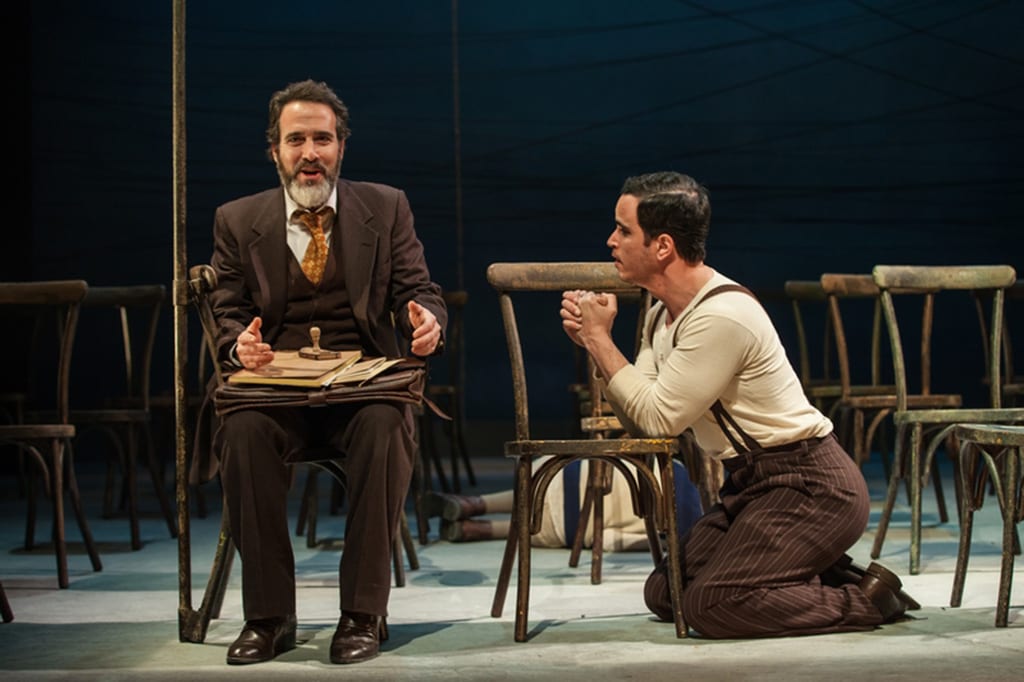When Anton Petrovich (Muli Shulman) returns from work one day, earlier than expected and excited to surprise his beloved wife (Michal Weinberg), he finds to his dismay an unexpected visitor in his very own bedroom. In response and after losing his good judgment, he runs to his neighbors – Romantovski (Ron Bitterman) and his supposedly retarded cousin Tomek (Ala Dakka) – and begs them to help him with his unique idea of revenge. However, these two have their own problems as Gustav (Eliran Harush), the collector of their house committee, and a mean, bitter young man, suspects them for informing his boss Mr. Berg (Zohar Strauss) of his embezzlement of the house fees. Under Gustav’s supervision is also Eleonora, who apart from getting in trouble with him is mourning her husband (David Pilgram), who has abandoned her with little Karl (adorable Yam Avni), since he wishes to travel to Spain.
These three complicated, intriguing and intertwined plot-lines take place in Vladimir Nabokov’s volume of short stories, “A Russian Dozen”; and like Nabokov himself, it reveals the lives of Russians immigrating to dark Berlin of the early 20th century. While living in the shadows, at the margins of this city, bubbling with culture, they try to find some happiness and fulfil their dreams. While watching the play, you will instantly feel the darkness of the city and times: loneliness, black strokes of life, heavy electrical wires, deep blue artificial sky… But the rest of the environment is left to your own imagination: fifty chairs areused on stage instead of any other decoration. Shir Goldberg, the director, said that she wanted to “achieve an industrialized, duplicated city map”, and to show how the characters beg for freedom as they are imprisoned in this urban, alien environment.
Another strong motif throughout the play is that of a butterfly, aspiring to use its gentle transparent wings and fly away from the grey, choking reality. Shahar Pinkas, the playwright of this version, combined all the heart-touching stories by Nabokov, and maintained to keep his very well-known sarcastic humor with doleful plot-lines. The marvellous, thought-provoking set made by Adam Keller, combined with the music perfectly selected by Nadan Vikinski and, for sure, Ariel Wolf’s exact mise-en-scene – are breathtaking. My partner and I had such a good time watching the play, and we warmly agreed that the actors were authentic, sharp and beautifully inflamed.
To cut a long story short, I will make my statement very clear: everything is right in this play. You should watch it! It was a rare, concise and creative show, and its creators were not afraid of breaking the rules by sending their professional actors into the unconventionalset of chairs that symbolize streets, houses, even a train and a bathroom. In my opinion, it is undoubtedly one of the most artistic and perfectly-made plays that I have seen in the last few years.
A few remarkable scenes and techniques include little sweet Karl’s conversation with Mr. Berg about butterflies andthe different moments in which the characters present the narrative like an autobiography; the constant surveillance of the homeless woman (also Michal Weinberg); and the different characters who smoke cigarettes, read or simply stare at the main events on stage, play with the chairs or other accessories. All these show us that the movement of life is unstoppable and happens simultaneously in every home.





